
Sucre is the constitutional capital of Bolivia, the capital of the Chuquisaca Department and the 6th most populated city in Bolivia. Located in the south-central part of the country, Sucre lies at an elevation of 2,810 meters. This relatively high altitude gives the city a subtropical highland climate with cool temperatures year-round.

Antonio José de Sucre y Alcalá, known as the "Gran Mariscal de Ayacucho", was a Venezuelan independence leader who served as President of Peru and as the 2nd President of Bolivia. Sucre was one of Simón Bolívar's closest friends, generals and statesmen.
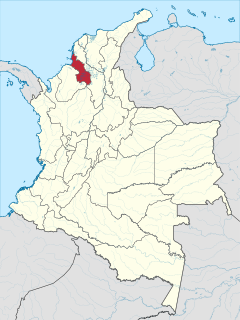
Sucre is a department in the Caribbean Region of Colombia. The department ranks 27th by area, 10,670 km2 (4,120 sq mi) and it has a population of 904,863, ranking 20th of all the 32 departments of Colombia. Sucre is bordered by the Caribbean on the northwest; by Bolívar Department on the east and by Córdoba Department on the west.

The Bolivian war of independence began in 1809 with the establishment of government juntas in Sucre and La Paz, after the Chuquisaca Revolution and La Paz revolution. These Juntas were defeated shortly after, and the cities fell again under Spanish control. The May Revolution of 1810 ousted the viceroy in Buenos Aires, which established its own junta. Buenos Aires sent three large military expeditions to Upper Peru, headed by Juan José Castelli, Manuel Belgrano and José Rondeau, but the royalists ultimately prevailed over each one. However, the conflict grew into a guerrilla war, the War of the Republiquetas, preventing the royalists from strengthening their presence. After Simón Bolívar and Antonio José de Sucre defeated the royalists in northern South America, Sucre led a campaign that was to defeat the royalists in Charcas for good when the last royalist general, Pedro Antonio Olañeta, suffered death and defeat at the hands of his own defected forces at the battle of Tumusla. Bolivian independence was proclaimed on August 6 of 1825.

The Sucre State is one of the 23 states of Venezuela. The state capital is Cumaná city. Sucre State covers a total surface area of 11,800 km2 (4,600 sq mi) and, as of the 2011 census, had a population of 896,921. The most important river in the state is the Manzanares River.

The Battle of Pichincha took place on 24 May 1822, on the slopes of the Pichincha volcano, 3,500 meters above sea-level, right next to the city of Quito, in modern Ecuador.
Juan Manuel Sucre Figarella (1925-1996), was a Venezuelan army Brigadier General who served as Chief of Staff of the Venezuelan Army in the 1970s during the administration of President Rafael Caldera. He is a member of the Sucre family and a direct descendant of Vicente Vitto Luis Ramón de Sucre Pardo y García de Urbaneja, the father of the War of Independence hero Antonio José de Sucre.
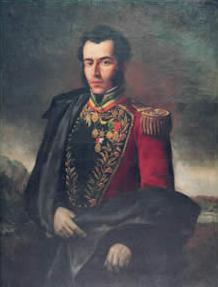
The Sucre Family is a prominent political family of Venezuela.
Leopoldo Sucre Figarella (1926–1996), was a Venezuelan politician and engineer of Corsican ancestors. A member of the Sucre family Sucre Figarella served as governor, minister and senator during his long and eventful political career. He was nicknamed "The Builder" and "The Czar of Guayana".
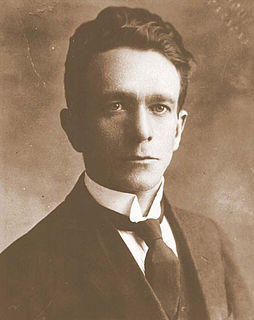
José Antonio Ramos Sucre was a Venezuelan poet, professor, diplomat and scholar. He was a member of the Sucre family of Venezuela and the great-great-nephew of Antonio José de Sucre. He was educated at the Colegio Nacional, and then at the Universidad Central de Venezuela where he studied Law, Letters and Languages.

Salvador Seguí Rubinat, known as El noi del sucre for his habit of eating the sugar cubes served him with his coffee, was a Catalan anarcho-syndicalist in the Confederación Nacional del Trabajo (CNT), a Spanish confederation of anarcho-syndicalist labor unions active in Catalonia. Together with Ángel Pestaña, Seguí opposed the paramilitary actions advocated and carried out by other members of the CNT. On 10 March 1923, while completing preparations to promote the idea of emancipation as a form of social empowerment among workers, he was assassinated by gunshot on Carrer de la Cadena, in Barcelona's Raval District, at the hands of gunmen working for the Catalan employers' organisation under protection of Catalonia's Civil Governor, Martínez Anido. At this same shooting, another anarcho-syndicalist, Francesc Comes, known as Perones, was wounded and was to die several days later.

Club Deportivo Universitario San Francisco Xavier is a professional football team based in Sucre, Bolivia that competes in the Bolivian Primera División.
"Panama" is the 42nd episode of the American television series Prison Break and is the 20th episode of its second season. The episode aired on March 12, 2007. The plot features the protagonists' escape to Panama while subplots include that of Sara Tancredi, Brad Bellick, Fernando Sucre, Theodore "T-Bag" Bagwell, Alexander Mahone and Benjamin Miles "C-Note" Franklin. Regarding the casting of this episode, Paul Adelstein does not appear in this episode. This is Benjamin Miles "C-Note" Franklin's last appearance until Rates of Exchange in season 4.
"Fin Del Camino" is the 43rd episode of the US television series, Prison Break and is the 21st episode of its second season. The English translation of the Spanish phrase, "fin del camino", is end of the road. Written by Matt Olmstead and Seth Hoffman, and directed by Bobby Roth, the episode first aired on March 26, 2007. The premise of the episode directly follows the events of the previous episode and includes two major plots with one taking place in Panama City and the other in Chicago. Regarding the casting of this episode, Rockmond Dunbar, does not appear in this episode.
Guillermo Sucre Figarella, was a Venezuelan poet and literary critic born in Tumeremo in the state of Bolivar. He was also a member of the Sucre family like his uncle Jose Antonio Ramos Sucre and his older brothers General Juan Manuel Sucre Figarella, and Senator Leopoldo Sucre Figarella.

The SUCRE was a regional currency proposed for commercial exchanges between members of the regional trade bloc Bolivarian Alliance for the Americas (ALBA), which was created as an alternative to the Free Trade Agreement of the Americas (FTAA). The SUCRE was intended to replace the US dollar as a medium of exchange in order to decrease US influence and control of Latin American economies and to increase stability of regional markets.
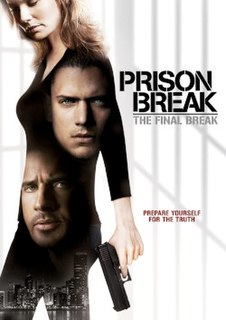
Prison Break: The Final Break is a 2009 television film of the Prison Break franchise. The movie covers the events which occurred in between the downfall of The Company, and the revelation of Michael Scofield's death. It details the manipulated arrest and incarceration of Sara Tancredi for the murder of Christina Scofield, the final escape plan which Michael devises for Sara, and the details surrounding Michael's death. It also reveals the ultimate fate of Gretchen Morgan. This was the initial ending for Prison Break, until the release of season 5.
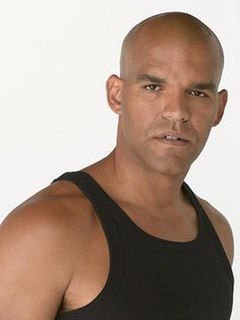
Fernando Sucre, played by Amaury Nolasco, is a fictional character from the American television series, Prison Break. He is introduced to the series in the pilot episode as the prison cellmate of the series protagonist, Michael Scofield quickly growing into a major character in the series.
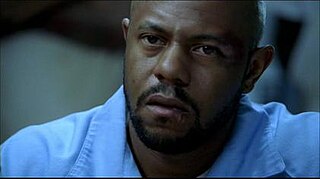
Benjamin Miles "C-Note" Franklin, played by Rockmond Dunbar, is a fictional character from the American television series, Prison Break. The character was introduced as a prisoner in the pilot episode. The actor was promoted from a recurring guest star to a regular cast member midway through the first season.

José Miguel de Velasco assumed offices as the 4th President of Bolivia on 12 August 1828. Due to the tumultuous events of the time, the original cabinet formed by Velasco on 12 August 1828 continued to function until 24 May 1829, spanning the entire six day presidency of Pedro Blanco Soto and the two nonconsecutive terms of Velasco which preceded and succeeded him.














